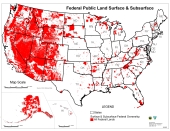








Joel Cederberg wrote:
I was unaware of this until this week, but apparently the homesteading act which was repealed by tricky dick nixon in way back when had a sort of ugly cousin called the desert land act. (links above)
anyway, apparently you can get up to 320 acres of land for 1.25 dollars an acre as long as special conditions pertain.
the land cannot have any claims on it
the land must have 0 useful mineral potential
the land must have 0 timber value
basically the land must be shitty desert wasteland. thats why its going for so cheap.
once such land is found, the person wanting the land has to get it surveyed out and give this along with a budget and some other documents and dirt samples to the local blm office. from what ive read there is a waiting list described as "large, or big" but also from what ive read, 60 percent of all desert land claims are in utah.
colorado new mexico, arizona, nevada, and idaho are also participating states, so i question the legitimate grandeur of such a waiting list.
because-
once all this has happened you must take it upon yourself to irrigate at least 1/8 of the total land you have claimed ( 40/320 acres ) within 4 years (there are cases where they will extend this). if you have only irrigated 20 acres of 320, it seems as though they can take away all land that has not yet been irrigated.
however, when done well, at the end of the 4 years, you get a patent for the land.




 2
2




 1
1












Subtropical desert (Köppen: BWh)
Elevation: 1090 ft Annual rainfall: 7"








I'm in the foothills of the San Pedro Mountains in northern New Mexico--at 7600' with about 15" of precipitation, zone 4b historically--growing vegetables for the local farmer's market, working at season-extension, looking to use more permaculture techniques and join with other people around here to start and grow for farmers markets.
 1
1




























Joel Cederberg wrote:http://water.library.arizona.edu/body.1_div.17.html ---> so if i understood this properly, in the state of arizona you are not allowed to be dependent upon percolating waters for reclamation because of how the state defines prior appropriation. therefore, in arizona one must buy the rights to water in order to reclaim land.
from what i understand you must purchase the right to use any water found in a channel with a definable bed and banks.
how does buying water rights work? it doesnt have to be a full on year round stream does it? could i buy the water rights for an erosion gully? would i need to?
Joel Cederberg wrote:when you say " You need to have a copy of the rules that have evolved in the implementation of the law." are you referring to the amendments to the desert land act?
I'm in the foothills of the San Pedro Mountains in northern New Mexico--at 7600' with about 15" of precipitation, zone 4b historically--growing vegetables for the local farmer's market, working at season-extension, looking to use more permaculture techniques and join with other people around here to start and grow for farmers markets.









Joel Cederberg wrote:when you say " You need to have a copy of the rules that have evolved in the implementation of the law." are you referring to the amendments to the desert land act?
Owner, Etta Place Cider





|
You would be much easier to understand if you took that bucket off of your head. And that goes for the tiny ad too!
Freaky Cheap Heat - 2 hour movie - HD streaming
https://permies.com/wiki/238453/Freaky-Cheap-Heat-hour-movie
|




